Omerta: City of Gangsters – Hands-On Preview
by Lorna
|
 For some gamers, the allure of the gangster world is a great one, and with the complex management structure, businesses fronting more shady goings-on, and oodles of ultraviolence, it has always lent itself well to games, in particular strategy management. Gangsters: Organized Crime from Eidos, back in 1998, was just such a title, bringing control of mobsters to your humble mouse and keyboard, and a tough bastard of a game into the strategy genre. It seems that Haemimont Games have also seen the potential and the perfect fit of theme to genre, and have developed Omerta: City of Gangsters, a gangster simulation/strategy game with turn based combat.
For some gamers, the allure of the gangster world is a great one, and with the complex management structure, businesses fronting more shady goings-on, and oodles of ultraviolence, it has always lent itself well to games, in particular strategy management. Gangsters: Organized Crime from Eidos, back in 1998, was just such a title, bringing control of mobsters to your humble mouse and keyboard, and a tough bastard of a game into the strategy genre. It seems that Haemimont Games have also seen the potential and the perfect fit of theme to genre, and have developed Omerta: City of Gangsters, a gangster simulation/strategy game with turn based combat.
Set in Atlantic City in the twenties, the story focuses on two penniless Sicilian brothers, one of whom heads for the USA to start a new life. It isn’t long before he gets a warm welcome, and ends up beaten and robbed. With no money, he is forced to start from the ground up, opting for an illegal business. When he has made enough, he sends for his younger brother, who enters law enforcement, pitting the two against one another. This ain’t going to end well, and we aren’t talking about a game of charades at the family Christmas dinner.
You start out with a simple hideout, which can be customised further down the line and expanded for extra perks, and a couple of cheap hoodlums to do your bidding. From here, you follow a series of objectives (which act as a tutorial early on), and begin to learn the ropes and build your business. Each gangster, including the boss, can be assigned a separate task and, once it is in progress, they are out of commission until it is complete. As you progress, you can unlock new gang members who can then be hired, with each one boasting different skills and talents. From this pool, you can build the team to suit your play-style, although a measly six will be your limit. When new mobsters are purchased, they don’t have to be ground up to match the level of the rest of your gang, instead, they enter at the same level. Everyone levels up at the same time, keeping things nice and ordered, if a little easy. At each level up, perks can be selected, but if you make a mistake or change your mind these can be rolled back and reset.
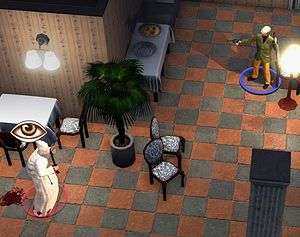 The game runs on a number of resources, including cash (clean and dirty – dirty comes from your various illicit activities, while clean is traceable and you can prove how you earned it), liquor, beer, and firearms. These can be procured through hard graft, for example, building your own brewery, or can be stolen in raids or purchased in deals with NPCs. While it can seem easy at the start to just nick what you want by kicking down someone’s warehouse door, this can have iffy consequences. What you do affects other gangs and businesses and you can’t please everyone. So if you rob a brewery to stock your speakeasy, the brewery owner will get pissed off at you, making a legit business transaction impossible in the near future, or even putting him out of business.
The game runs on a number of resources, including cash (clean and dirty – dirty comes from your various illicit activities, while clean is traceable and you can prove how you earned it), liquor, beer, and firearms. These can be procured through hard graft, for example, building your own brewery, or can be stolen in raids or purchased in deals with NPCs. While it can seem easy at the start to just nick what you want by kicking down someone’s warehouse door, this can have iffy consequences. What you do affects other gangs and businesses and you can’t please everyone. So if you rob a brewery to stock your speakeasy, the brewery owner will get pissed off at you, making a legit business transaction impossible in the near future, or even putting him out of business.
Not that putting a rival out of business is anything to get teary eyed about, as all building have an efficiency rating, which is affected by surrounding businesses. A rival speakeasy close to yours will have a negative impact on both businesses, pulling down the efficiency rating. ‘Solutions’ can involve a drive-by, buying the other owner out, or even turning him in to the police.
Of course, if you act too thuggishly, the boys in blue are bound to take an interest, and the right side of the HUD is home to a number of stars – the heat meter - which will show just how much your actions have drawn the interest of law enforcement. Police interest can restrict your activities, and the worst case scenario is that there will be a police investigation, which can lead to you being busted – game over. You can head this disaster off by calling in a favour from a friendly cop, bribing an investigator, turning in a fellow gangster to take the fall, or simply breaking into the police station and destroying evidence.
 |
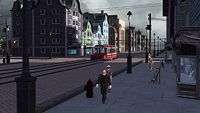 |
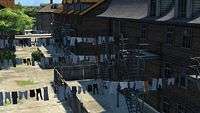 |
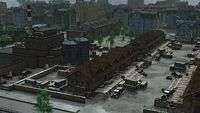 |
 |
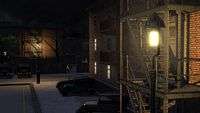 |
Also available to access is the map screen, where you can do deals and take offers from NPCs, who may want a certain number of units of beer or firearms for a set price. These offers never hang around for long, so if you can’t fulfil them you’ll miss out. They can be a good way of earning fast cash, although deals can sometimes develop complications and go wrong. This seems to be a reflection of life in that you have to respond and adapt to what is thrown at you and there is no telling beforehand of something will go wrong – it is just the chance that you take. Similarly, what may seem like a simple warehouse raid that you have pulled off a dozen times before may not go so well the next time, as you run into trouble or even a rival gang, sparking off a combat scenario.
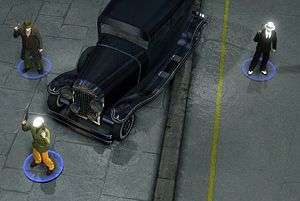 Some combat scenarios can auto-resolve, with a variable chance of success increased by how many team members there are involved and their skills. However, you won’t be able to shirk getting your hands dirty for long and, sooner or later, you’ll be pulled into the surprisingly good combat that the game has to offer. Each team member, of which you are allowed four in combat, has a set number of Action Points (for shooting, clubbing, healing, etc.) and Movement Points. Footprints on the floor show just how far your Movement Points can take you, which is handy, but be sure to move first and shoot later, because when your Action Points are done, that’s turn over for your guy.
Some combat scenarios can auto-resolve, with a variable chance of success increased by how many team members there are involved and their skills. However, you won’t be able to shirk getting your hands dirty for long and, sooner or later, you’ll be pulled into the surprisingly good combat that the game has to offer. Each team member, of which you are allowed four in combat, has a set number of Action Points (for shooting, clubbing, healing, etc.) and Movement Points. Footprints on the floor show just how far your Movement Points can take you, which is handy, but be sure to move first and shoot later, because when your Action Points are done, that’s turn over for your guy.
Rather than being the standard “you go, I go” mechanic, the play order of allied and enemy character turns is mixed up, as one person may have a certain talent/perk or speed advantage, which means that they will jump their place in the queue (displayed at the top of the screen as portraits). Your gang can be equipped with various pieces of weaponry, all with differing effects and options. With the shotgun, for example, you can take on multiple targets, shoot through cover, or deliver a nasty stomach shot, which will see the enemy bleeding out over multiple turns. Not only that but courage can be affected and weapons such as the Tommy Gun, which can take on groups of foes, also causes a lot of fear, restricting what the enemy can then do when their courage takes a hefty dent.
All weapon actions have an Action Point cost, such as second wind (removes negative conditions), recharge specials after each kill, etc. Not only that, but each weapon has various types of shots, such as aimed shots, which will cost additional Action Points in exchange for greater accuracy (not that that’s any sort of guarantee that your man won’t miss from point blank range). If the fight seems unwinnable, it is sometimes possible to back out, but there will be consequences, such as nasty wounds, a reduction in Action Points, and even gang members jailed.
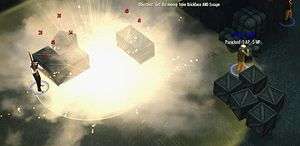 One consequence that is notably off the table is death. Omerta appears to have avoided the often brutal difficulty of Eidos’ Gangsters; when a gang member bites the dust in a scrap, they aren’t dead, nor is your boss, should he end up face down in a pool of blood. If you lose someone on a mission, then they simply end up in jail (having been conveniently healed), rather than pushing up the daisies. You can then break or otherwise get them out, but they are still very much in the land of the living.
One consequence that is notably off the table is death. Omerta appears to have avoided the often brutal difficulty of Eidos’ Gangsters; when a gang member bites the dust in a scrap, they aren’t dead, nor is your boss, should he end up face down in a pool of blood. If you lose someone on a mission, then they simply end up in jail (having been conveniently healed), rather than pushing up the daisies. You can then break or otherwise get them out, but they are still very much in the land of the living.
I was rather on the fence about this. While it makes the game far more forgiving (and accessible to genre newcomers, especially given that it will see an Xbox release – not traditionally the home of hardcore strategy management) and will help people build and retain a strong team, without having to constantly replace mobsters, it does lend an all too blasé feel to proceedings. I was far less careful on missions than I would have otherwise been if death was a factor. As such, there is no real threat of failure, at least in that respect, which has the effect of removing a thick slice tension – not ideal.
There is still a game over scenario, in that if you fail to stop a police investigation into your activities, it’s curtains, but death would have lent a more pressured air to proceedings and its absence is questionable, especially on higher difficulty settings. Graphically, Omerta looks good, with the ability to zoom into the city and survey the various districts and lots, from piers to buildings, beaches, wasteland, and parks. There are a myriad of nice touches, from the rain causing pedestrians to crack out their umbrellas, to the way gobs of water spatter the roads and pavements and ripple bodies of water that make it more diverting than the sepia-toned, prohibition-wracked city that I had expected.
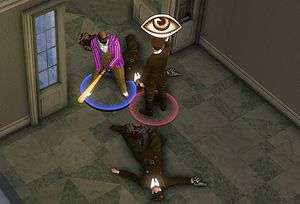 Although I only got hands on with the PC version, I did have the chance to see the console offering in action and the Xbox 360 version looked pretty intuitive (despite being played with a controller) and looked pretty good, with moody lighting and decent visuals.
Although I only got hands on with the PC version, I did have the chance to see the console offering in action and the Xbox 360 version looked pretty intuitive (despite being played with a controller) and looked pretty good, with moody lighting and decent visuals.
In addition to the story mode – said to be at least 20 hours – there is a multiplayer mode available in which you can create a separate gang and challenge randoms or friends. However, if you fancy some co-op action, it is possible to team up with your mates and turn over a few banks, should the mood take you.
Omerta: City of Gangsters is looking good, offering a decent story mode, in which the player can opt for their own path and play style. Whether you want to play Mr Nice, schmoozing politicians and laying in soup kitchens to bolster your public image, or whether you want to shoot the fuck out of the opposition and rule by fear, you can. It looks pretty, plays well, and the combat is surprisingly easy to pick up. While the no death element is questionable, and may well put more veteran players off, Omerta is certainly an absorbing title, with a great deal of promise and well worth an inclusion on next year’s ‘to play’ list.
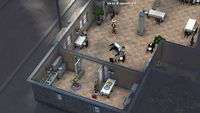 |
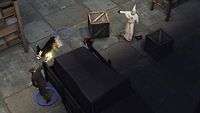 |
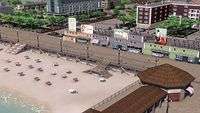 |
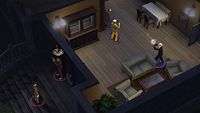 |
 |
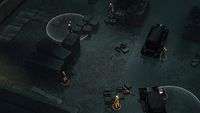 |
Last five articles by Lorna
- Flagging Heart
- Where Have All the Hours Gone?
- I Heart... Overlord
- Life Goes On: Done to Death - Review
- Welcome to Spoilerville, Please Despise Your Stay

















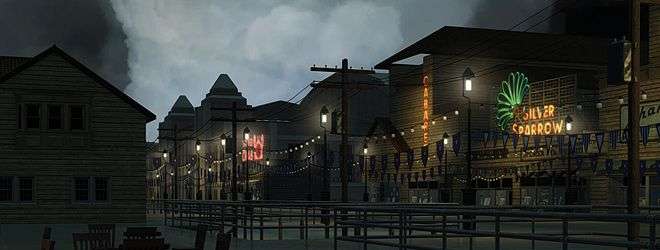
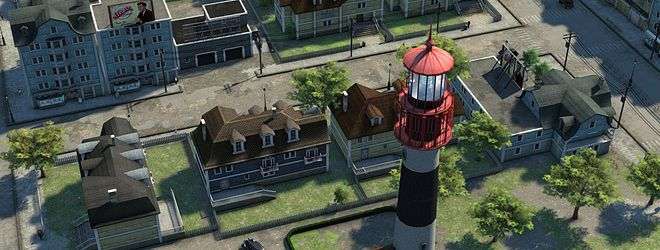
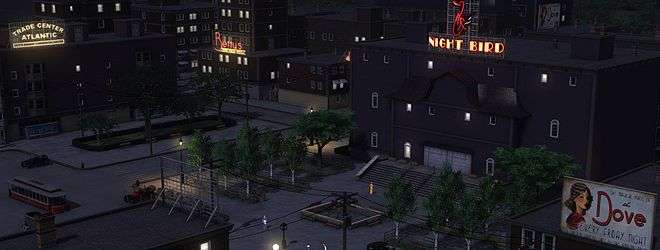





You know that I’m already excited by this game BUT… what you probably don’t know is that the graphics appear to have changed considerably since I first saw it. There’s more shading, more detail, just more of everything really. I suppose that, to most people, it won’t make any difference if the graphics change when it’s all about the gameplay and strategy, but if I get to soak in a little bit more eye candy then I’m happy.
If this turns out to be less than what I expect (which tends to be the case with pretty much every game released these days), I’ll be seriously disappointed. Hope not though. Really looking forward to it!
This looks fun but also reminds me of Smooth Criminal.
That’s tonight’s “song stuck in my head” sorted then, thanks Richie!
It sounds like XCOM, but set in the land of the gangsters, and without permadeath, and a lot more resource/base building.
I’m sold. If they add in the option for permadeath, that’d be the icing on the cake
[...] the few plot critical combat scenarios) that the game will end. This point was raised by Lorna in a previous preview and hasn’t had any further alterations, so it remains that the lack of punishment for screwing up [...]